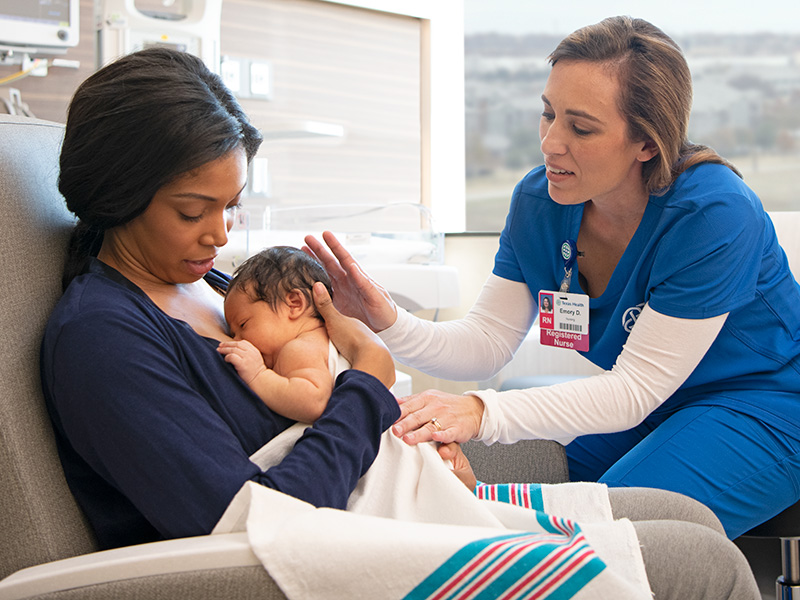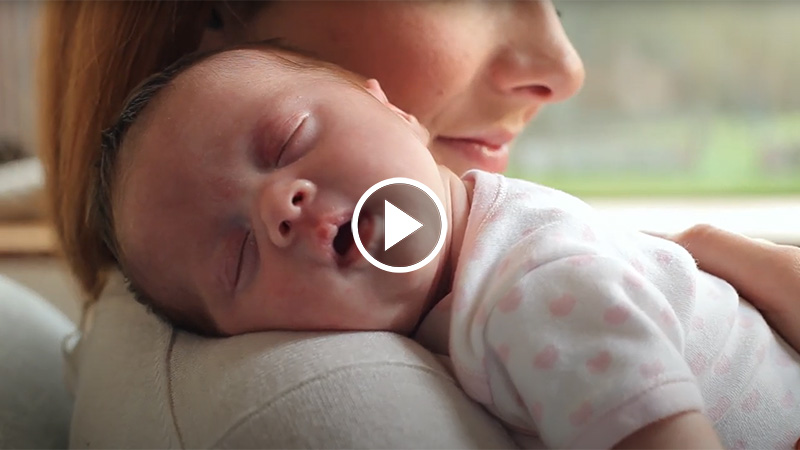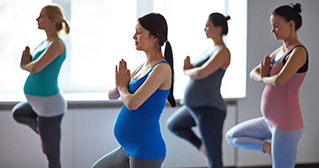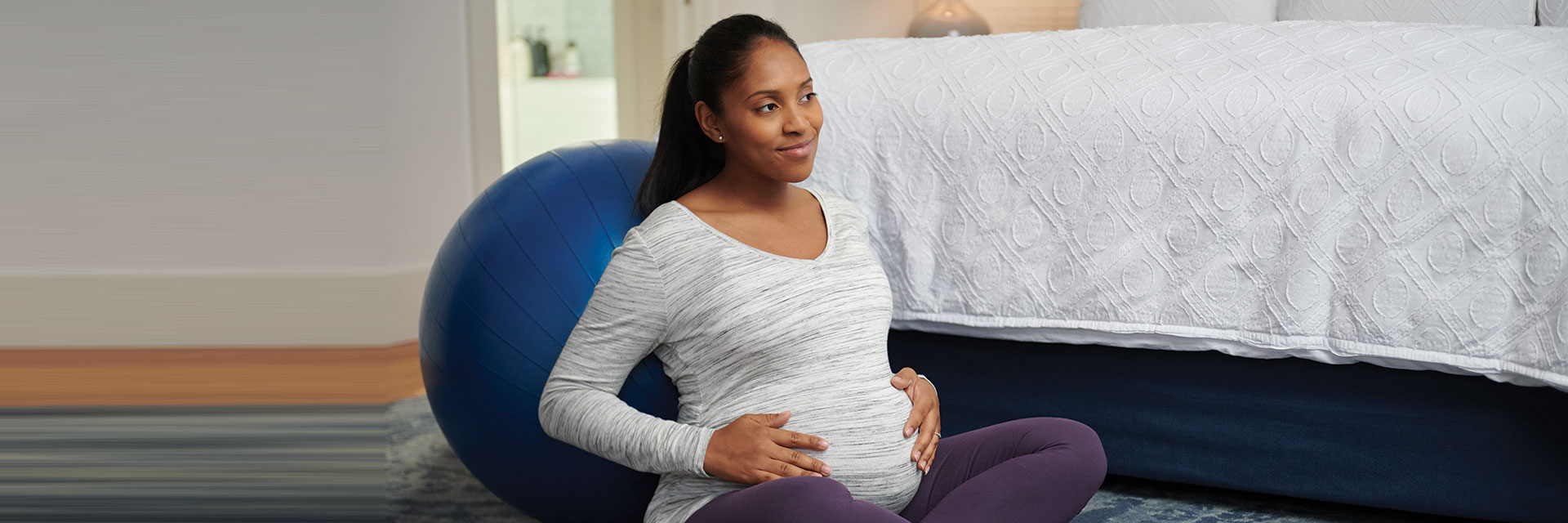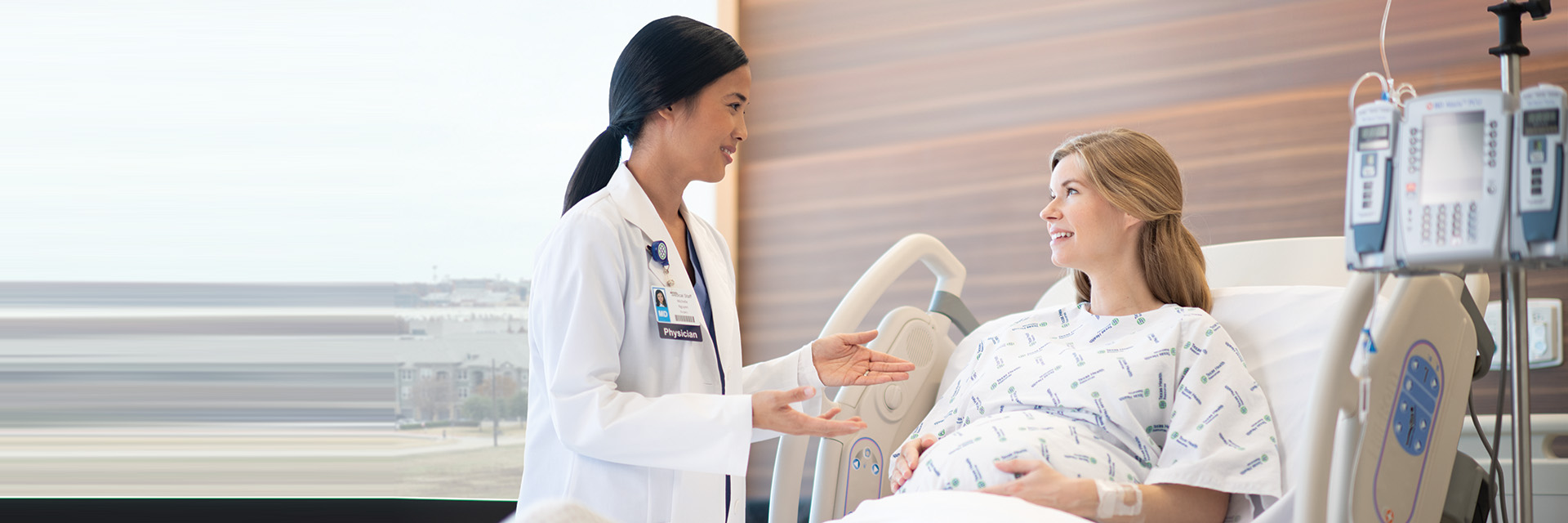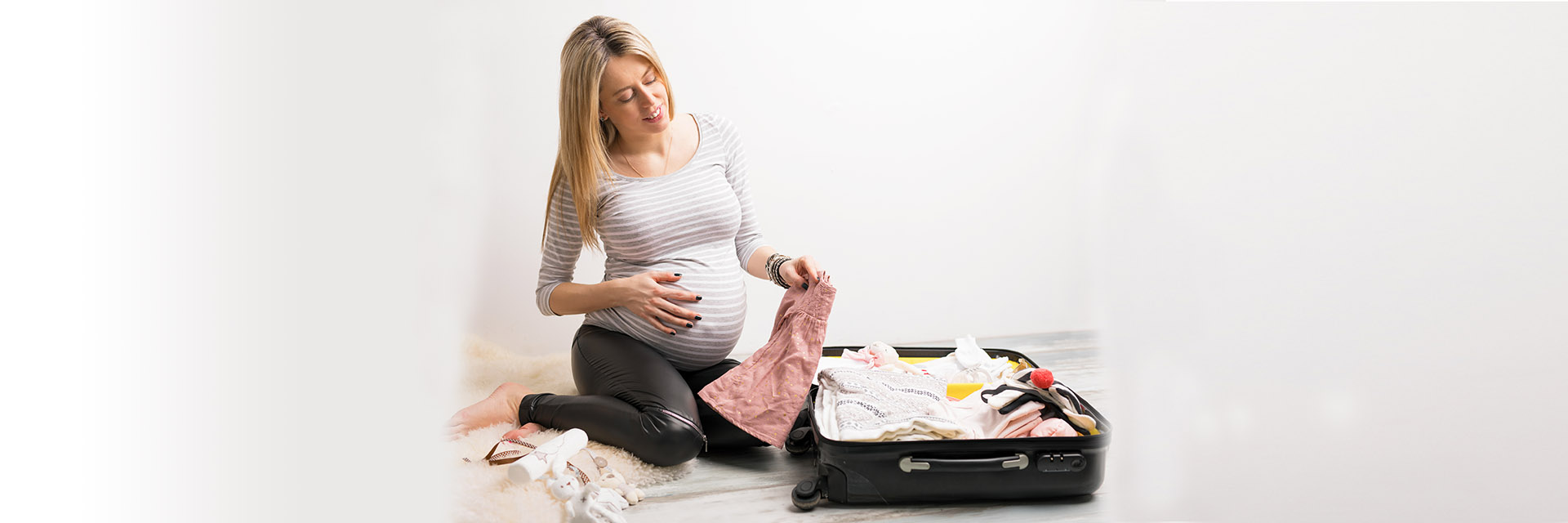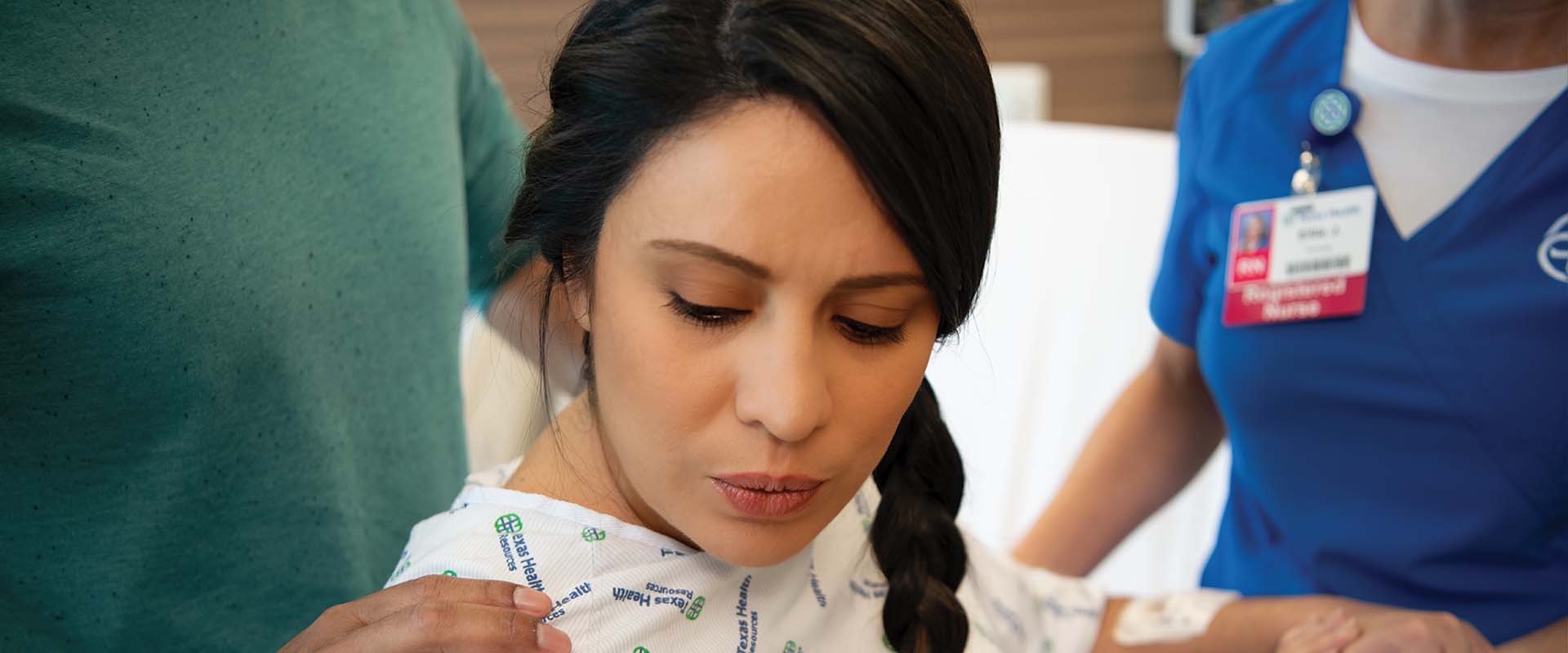-
Arriving for Labor and Delivery
Where to Park
Texas Health Flower Mound has a large parking lot in front of the hospital. Moms arriving for labor during daytime hours can be dropped off at the main entrance for convenience. If arriving at night, you should park and enter through the emergency department
Where to Check-In
Families should check in at the main hospital admissions desk on the first floor of the hospital or in Labor and Delivery on the third floor of the hospital. If after-hours, families will check-in through the emergency department.
-
Items to Bring with You to Labor and Delivery
When packing a labor bag, be sure to include:
- Driver’s license or ID card
- Insurance information
- Phone, camera, and charging cables
Other items that may keep you comfortable during labor include:
- A deck of cards, books, magazines, music, tablet, etc.
- Bathrobe or labor gown
- Labor support tools
- Comfy slippers/socks (skid-proof)
- Snacks for your partner
Please note you will not need your luggage or car seat until after you are moved to your Mother/Baby hospital room, approximately 2 hours after delivery.
-
Your Labor and Delivery Room
We are here to help you have the birth experience that best fits your wishes and needs. Our labor suites are designed to support you through the birth process -- labor, birth, and recovery.
What’s In Your Labor and Delivery Room
Our spacious Labor, Delivery and Recovery suites can comfortably accommodate you and your birthing family. Each suite includes:
Birth Plans
If you have a birth plan, please share it with the nurse when you arrive at your labor suite. You do not have to create a birth plan. We will try to follow your wishes as long as they do not interfere with the health and safety of you or the baby.
-
Visitors During Labor and Delivery
-
Photography
Documenting this special occasion is important for many of our families. Cameras are allowed with the following conditions:
- Your provider and any nurses or other providers in the room must consent to the photography.
- Photography can begin only when allowed by the provider or hospital staff.
- The photographer must obtain permission from hospital staff before taking their picture.
- Only hand-held devices are allowed in Labor and Delivery (no tripods).
Texas Health Flower Mound does not allow the birth to be videotaped. Please note that the provider or nurse may require an individual to stop photographing at any time.
-
Pain Management and Labor Support Tools
There is no medical best choice for managing pain during labor. Everyone has different pain thresholds. Instead, it’s a question of what makes the most sense for you and your partner. If you find that you want additional pain management during labor, the options available at Texas Health Flower Mound include:
- IV medication
- Epidurals
Labor Support Tools
Texas Health Flower Mound has birthing balls, peanut balls, and labor bars for use during labor. When you arrive at Labor and Delivery, please notify your nurse if you would like to use one of them. We welcome patients who wish to bring other labor-support tools including a birth gown, music players, aromatherapy, blankets, pillows, etc.
-
Doulas
Expectant parents often find it helpful to have the support of a doula. Doulas are trained in providing emotional and physical support and helping women to carry out their birth plans. Please discuss with your physician if you plan to use a doula as part of your birth plan for labor support.
-
Scheduled Cesarean and Inductions
Our goal is to maintain scheduled delivery dates. To provide excellent care to you during the birth of your child(ren), the scheduled time of your arrival might change. If there are any changes, we will call you (usually 1-2 hours before admission). We will also communicate any changes with your doctor. If you have questions or concerns about changes to your scheduled delivery, talk to your doctor.
Before Your Delivery
If you are having a scheduled induction or cesarean at Texas Health Flower Mound, please remember the following:
- Do not eat or drink at least eight hours before the procedure, or the procedure may be rescheduled, possibly to another day.
- Remove all jewelry and leave valuables at home.
Scheduled Cesarean Births
When you arrive, tell the admissions clerk you are there for a scheduled procedure. You will be taken to your room, where you will remain for approximately two hours. During this time the nurses will monitor the baby and check your vitals. The doctor who administers your anesthesia will visit you to discuss your options before you are taken to the operating room.
Typically, your physician, a physician’s assistant, a nurse, an anesthesiologist, and a certified surgery technician are in the operating room to care for you. There will also be a team dedicated to your baby in the operating room. One support person may be in the operating room during the surgery if there are no safety concerns. Typically, you will be in the operating room for about one hour. After the surgery, you will be moved back to your Labor and Delivery room with your baby and support person. You will remain in recovery for about two hours. If there are no safety concerns, you will have skin-to-skin time with your new baby to establish the first feeding.
Learn more about what to expect before, during and after your c-section.
-
After Delivery: What to Expect
The Golden Hour
The first hour after birth is called the golden hour, when we encourage only mom, baby and one support person in the room to promote bonding, rest, and relaxation.
Skin-to-Skin
As soon as possible after birth, nurses will place your baby skin-to-skin for at least an hour to allow time for the first feeding. Skin-to-skin time helps your newborn stay warm, stabilizes blood-sugar levels, and is considered good for all babies.
Baby’s First Examination
After the first hour, your newborn will be examined in your birth room, which will allow your family to be part of the baby’s first exam and measurement.
Your Pediatrician is Notified
We encourage you to select a pediatrician before your baby’s birth. After the birth, we will notify your pediatrician that you have delivered. If you do not have a preselected pediatrician or one with hospital privileges, your baby will be seen by the on-call neonatology service.
Transition to Your Hospital Room
You and your baby will remain in Labor and Delivery for approximately two hours before transfer to your postpartum suite where you will stay for the rest of your visit.

-
Your Mother Baby Room
Location
All Mother and Baby rooms are located in our secured (locked) unit on the third floor and can be accessed by using the electronic communication box on the wall to request access to a specific patient room.
What’s In Your Room
Mother and baby rooms are as inviting as the family and friends that surround you. Each room comfortably accommodates families during their hospital stay and includes:
- Flat-screen TV with a USB port for your streaming devices
- Free internet access
- Couch that converts into a comfortable bed
- Temperature control for your suite
- Full-size bathroom
-
Mom's Recovery: What to Expect
How Long You Will Stay
Typically, you will be discharged between 24 and 48 hours after a vaginal delivery. For a cesarean, you can be discharged between 48 and 72 hours after surgery. Exceptions exist for shorter and longer hospital stays, if needed. Talk with your nurse about when you hope to be discharged.
Get Up and Walk
Within six hours of after giving birth, vaginally or by cesarean section, your nurse will help you get out of bed to walk around. Walking will improve your circulation and prevent blood clots.
You Will be Visited Regularly
Your nurses or the patient care assistant will check on you regularly. If you would like less frequent visitations, just let the nurse know.
When You Can Eat
After an uncomplicated vaginal delivery, you can eat as soon as you desire. Following a cesarean birth, a nurse will offer liquids during recovery and within six hours you will be eating regular food.
-
Baby's Hospital Stay: What to Expect
Baby’s Screenings and Procedures
During your hospital stay, your baby will be examined by a neonatologist, pediatrician, or a neonatal/pediatric nurse practitioner, every day. If your pediatrician has privileges at the hospital, they or someone from their practice will visit you daily. If your pediatrician is not on the medical staff, you will be visited by a provider from the hospital neonatology service. In addition, your newborn will have several tests that may include:
- Blood screen (age 24 hours)
- Hearing screen
- Jaundice (Bilirubin screening)
- Heart screen (age 24 hours)
- Car-seat screen (when applicable)
Circumcision
Circumcision for a boy infant may be completed during the hospital stay, if desired. Your baby is returned to you typically within an hour of the procedure.
Delayed Bath
Texas Health Flower Mound will typically give a bath to the newborn about 24 hours after the birth. Bathing after 24 hours has been associated with an increased likelihood of exclusive breastfeeding at discharge and a decreased incidence of hypothermia and hypoglycemia in healthy newborns
Where Baby Will Stay
Texas Health Flower Mound works to minimize the separation of moms and babies. We encourage moms to keep their babies in their hospital rooms (including nighttime), a practice called rooming-in or couplet care. Even the babies’ evaluations and examinations may take place in the moms’ rooms. Moms also have an opportunity to learn their babies’ cues with hospital personnel nearby to answer questions and provide education. With support and guidance from experienced nurses, parents gain the skills needed to confidently care for their babies, in the comfort of their hospital rooms.
If you have a cesarean section, a support person will need to stay with you for the first 24 hours to help care for the baby.
-
Visitors
-
Room Service Dining
Texas Health Flower Mound is proud to offer room service dining for both mom and a support person during their stay, seven days a week.
Take Home Meal
The arrival of a new baby is one of life’s most important milestones. To help celebrate this momentous occasion, Texas Health Flower Mound offers a gourmet celebratory meal “to-go” to make the transition from hospital to home a little easier.
-
Birth Certificate and Social Security
During your hospital stay, a coordinator will contact you to complete the necessary paperwork to record your baby’s birth. You will be given documentation that can be sent to your insurance company. If you have not received a visit from the coordinator, talk with your nurse.
Get more information on requesting your child’s birth certificate or social security information.
-
Breastfeeding Support
During your hospital stay, your nurse will be the primary contact for breastfeeding education. A certified lactation consultant is also available Monday thru Friday to provide one-on-one assistance in the privacy of your room.
-
Discharge Day: What to Expect
Even if your doctor declares you are ready to go home, there is still a process that must be completed for your safety and security.
Things to Discuss with Your Family and Nurse
Are you ready and do you have the things you need before going home? Discuss these questions with your family (If you have questions or concerns, please talk with your nurse):
- When do I think I will be going home (day and time)?
- How am I getting home?
- Who will help me at home?
- Do I have the supplies I need?
Steps that Happen on Discharge Day
Before you go home, the following must be completed:
- Your baby’s heart screening, newborn screening test and hearing screen were completed
- You have made a follow-up appointment for your newborn
- Your OB/GYN has visited and said you can go home
- Your prescriptions have been ordered or sent to your pharmacy
- The pediatrician has visited and said your baby can go home
- You have completed all necessary paperwork
- You have reviewed your medications with a nurse
-
Take Home Meal
The arrival of a new baby is one of life’s most important milestones. To make the transition from hospital to home a little easier on parents, Texas Health Flower Mound provides a take-home meal to families on your discharge day.
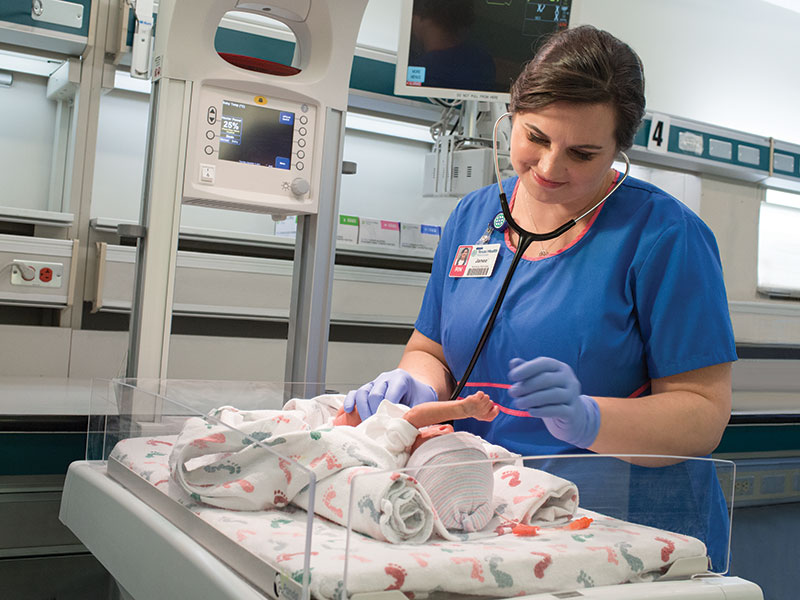
Support for New Moms
